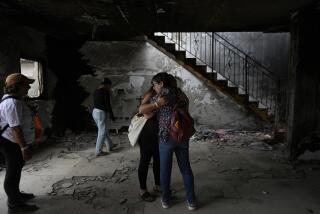In Moscow, a Dirge for Defenders of White House : Russia: Thousands of hard-liners gather to pray for victims of violence at Parliament, and to curse Yeltsin.
- Share via
MOSCOW — Several thousand mourners gathered Saturday in the shadow of the shattered Parliament building for a Russian Orthodox ceremony to pray for the souls of those killed in last month’s hard-line rebellion.
On a gray street swept by bitter November winds, a chorus of white-frocked priests sang the ethereal dirge traditionally offered 40 days after death, when the Orthodox believe dead souls rise from Earth to meet their God.
Mourners held candles or flowers, crossed themselves, muttered laments or cursed the government of President Boris N. Yeltsin as the names of the fallen were read aloud. More than 140 people died in the October unrest, according to the official count.
“May God pardon and open the gates of heaven to all those killed in fratricidal war,” a priest intoned.
Construction workers perched in the scaffolding of the nearby White House stopped repairing the pockmarked Parliament building and stood watching the proceedings below.
Laboring round the clock, the workers have already removed the soot that had encased the top of the white marble fortress and prompted Muscovites to dub it “the Black House.” Holes left by tank shells are neatly covered with plywood.
The White House workers are being paid $250 a month--up to three times the normal wage--and have been ordered to get the building ready for the new Parliament, or Duma, that is to be elected Dec. 12, the Interfax news agency reported.
One of the mourners said he has no doubt that Yeltsin would not hesitate to use force against his opponents again.
“This is neither the first nor the last blood in the civil war that is going on in this country,” said Alexander N. Skvortsov, a 59-year-old economist. “At least now we clearly know the danger for everybody who chooses to think and speak differently from our Mr. President.”
Despite the frigid weather, the memorial service drew more than 3,000 people, mostly implacable Yeltsin enemies. Before and after the service, they argued among themselves about whether to boycott the elections, as some hard-line leaders have proposed.
Several of the most radical opposition parties, including those led by former Deputies Sergei N. Baburin and Viktor V. Aksyuchits, failed to collect enough signatures to qualify slates of candidates for the ballot.
But Baburin and Aksyuchits may still run for the Duma as individuals provided they submit 5,000 signatures to the federal election commission by midnight today. Their supporters were busy Saturday buttonholing mourners for signatures and trying to convince skeptics that to boycott the election would only make the Duma a Yeltsin rubber stamp.
Aksyuchits said he doubted that he would be able to gather the required signatures.
“People are scared, and many are misinformed,” he said. “To collect signatures in this short a time, you would have to be allowed into factories on the boss’s orders--and they won’t let us in.”
If he fails to qualify, Aksyuchits said he would likely throw his support to the Agrarian Party, which opposes privatization of collective farms and other land reforms proposed by Yeltsin. Other mourners said they will support Gennady A. Zyuganov’s Communist Party of the Russian Federation, which collected more than enough signatures to qualify.
As usual, anti-American and anti-Semitic rhetoric laced the political debate. Posters declared that Yeltsin was acting on Zionist orders when he crushed the pro-parliamentary rebels last month. A display of icons and flowers caged in barbed wire was captioned, “A present from Clinton and the Zionists.”
Walls near the White House bore the bright-red slogan, “Yankey (sic) Get Out of Russia,” and an elderly woman selling underground newspapers punched and kicked a Western journalist who approached her with tape recorder in hand.
“This is a new totalitarian state,” said Yelena, a meteorologist who declined to give her last name for fear the intelligence service would track her down.
In fact, the Kremlin is promising to keep extremists from staging a comeback.
On Friday, Yeltsin adviser Gennady E. Burbulis said the instigators of the October revolt are still active and dangerous. In an interview published Saturday in Rossiyaskaya Gazeta, a top official of the former KGB said that Yeltsin had personally stressed the need to improve intelligence on extremist groups.
First Deputy Security Minister Sergei Stepashin said Yeltsin had approved all of the agency’s proposals, including a new section of the anti-terrorism department to be responsible for “detecting, preventing and suppressing anti-constitutional activities by extremist groups posing as political parties and social movements.”
The Vesti television news program reported on the memorial service and then commented that many people, especially those who lost friends and relatives, are wondering whether the organizers of the bloodshed would be punished.
The official death toll from the October violence has risen to 146, according to Moscow Heath Department officials. The anti-Yeltsin forces insist that the real death count was much higher but have produced no evidence to support this claim.
More to Read
Sign up for Essential California
The most important California stories and recommendations in your inbox every morning.
You may occasionally receive promotional content from the Los Angeles Times.













